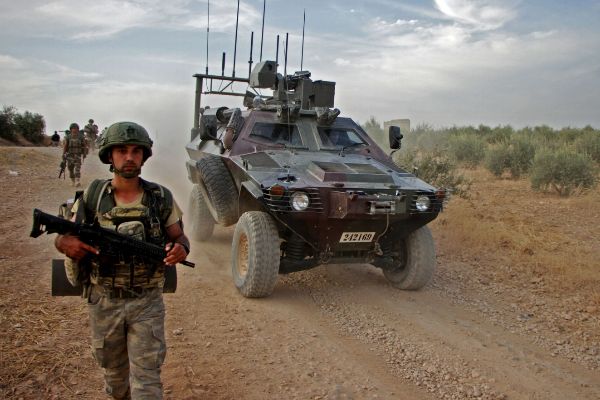- Conflict: who is who on the Syrian battle stage
- Stopper zone: a Turkish protectorate in northern Syria
On October 9, Turkey launched a military operation in northern Syria with the long-planned goal of weakening the Kurdish People's Defense Units (YPG). We analyze the strategic implications of this incursion.
What do you expect to get Ankara?
Turkey has been pressing for years to create a buffer zone in northeastern Syria. The objective is to achieve military control of an area about 480 kilometers long parallel to the border and about 30 kilometers deep within Syrian territory east of the Euphrates River. The control of this strip would result in the expulsion of the YPGs from that territory. In addition, Ankara intends to resettle in this area a large number of the more than 3.6 million Syrian refugees that Turkey hosts in its territory.
What motivates the operation against YPG?
Turkey presents the YPG as a threat to their security. It links this Kurdish militia with the Kurdistan Workers Party (PKK), the group that in the 80s raised arms against Ankara. The conflict has caused 40,000 deaths since then. Turkey qualifies the PKK as a terrorist group (as does the US and the EU). Already in January 2018, Turkey launched the 'Olive Branch' operation against the YPGs, which it calls the PKK franchise in Syria. With this new operation, he hopes to patrol the buffer zone and push Kurdish militiamen away from their border.
Can the Islamic State resurface?
That may be one of the consequences of the Turkish incursion, the withdrawal of US forces and the weakening of the YPG. It should not be forgotten that Kurdish troops constitute the bulk of the Syrian Democratic Forces (SDF), used by the US as a bridgehead to fight the IS. Washington proclaimed the defeat of the jihadist group, after last March the SDF captured the last bag of territory in the hands of the IS. But in August the Pentagon confirmed that it was aware of the existence of "cells" that were perpetrating "murders, suicide attacks, kidnappings and crop burning . "
What does Turkey intend to do with Syrian refugees?
Turkey is the country that receives the most Syrian refugees in absolute terms. For years, it has generously allowed them to settle in their territory, but the recent electoral defeat of the president, Recep Tayyip Erdogan, in Istanbul and the worsening of the economic crisis since 2018 has raised an anti-desert resentment among the population, fostered by the authorities , which accuses them of "stealing" their work and "invading" the country with its Arab and conservative cultural values. A survey conducted by the Kadir Has University in Istanbul recently revealed that only 7% of Turks are satisfied with the current government policy towards refugees. Erdogan has long cherished the project of establishing a safe area in Syria to send to refugees. The plan this time is to build 140 villages in northern Syria with a population of about 5,000 inhabitants each, in order to establish there one million Syrians in 50 districts with a population of 50,000 people each.
What implications can the transfer of refugees have to the buffer zone?
Apart from the fact that it is against International Humanitarian Law to return refugees to conflict zones (it is not clear that this buffer zone is 100% safe), the movement implies population displacements that could constitute ethnic cleansing , since they would evict the indigenous population, eminently Kurdish and Christian, to house mostly non-originating Sunni groups. Since the beginning of the Turkish incursion, more than 160,000 people have become forcibly displaced. Erdogan's ambitious plan is also difficult to implement without international funding. Mehmet Tezkan, an analyst at the Turkish portal T24, argues that it will be almost impossible to send refugees to the buffer zone: "This will require 24,000 million euros. Who will pay them?"
According to the criteria of The Trust Project
Know more- Turkey
- Syria
- Islamic State
- Refugees
- U.S
United StatesDonald Trump orders to prepare sanctions against Turkey for its offensive in Syria
Conflict Turkey says Spain has notified it that it will "not renew" its Patriot missile battery
Middle East Erdogan's operation in Syria: 64,000 displaced in one day and good news for the Islamic State

